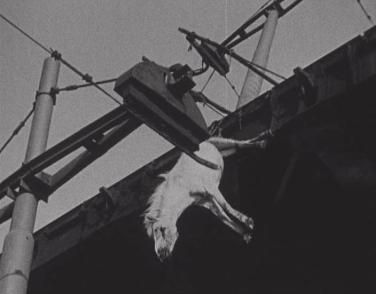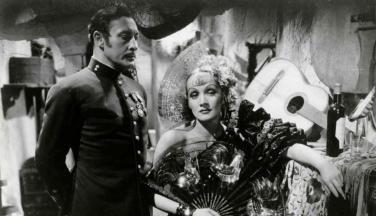These sessions are part of EQZE's academic syllabus; therefore, all screenings will be accompanied by a prior presentation/lecture.


What would a running history of cinema be like if it revisited its sources again and again so as to be continually rewritten? We've asked Santos Zunzunegui –professor, historian and screenwriter– to make his personal selection of films from the history of the cinema so that, from that list of titles, (titles which are, to a greater or lesser extent, canonical, personal, profound, chronological) a certain "common ground" may be found to continue reflecting on the possible and impossible histories of the cinema.
These sessions are part of EQZE's academic syllabus; therefore, all screenings will be accompanied by a prior presentation/lecture.
“I see myself enter into an old neighbourhood cinema. When I reach the screening room, darkness reigns over it while, on the screen, a few pretentious aristocrats denounce all that defies self-righteous appearances. A horse killed by bullets hangs, not moving, from one of the bridges that span the Neva. Suddenly, the prisoners rise up and sing La Marseillaise, defiant, while the camera pans around them with a warm movement. At the door of his house, a devastated man watches as his wife and his small children abandon him without understanding that he has an inexorable mission to fulfil. In the sullen early morning, the partisan forces are thrown to a river that will serve as a shroud. The caravan of outcasts crosses the never-ending desert in search of a new home. After the family's breakup, the only thing that remains is the wind which moves the barley in the fields waiting to be harvested. A little old woman sits on the veranda with a rifle in her lap to defend the innocence of childhood. On the gridded page of a notebook, identical to so many others like those that I so often filled in my childhood, a hand writes: "je sais que d'habitude...". The sun rises over the sea in the vicinity of Lubeck, while the dual choir implores Jesus to have mercy on us. In the distance, Hossein catches up to Tahereh amongst the olive trees, in search of the long-awaited answer. A whispering voice reminds me that the cinema is a space that is inhabited by all histories, all that have been, all that will be. Fateful beauty.
I get up. I struggle to get to my feet and I go outside, after having passed through paradise in a dream. That is my profound experience as a cinema spectator. The experience of having attended (and of continuing to attend) an imaginary, never-ending film in which, tied together, in a continuous circle, are images that the winds of many a story have gathered in a unique narrative that only has been told to me”.
HISTORIES OF CINEMA 2.
"Cycles return, like seasons, and they are not similar to each other. Or, rather, they are not similar to each other on the surface; but, they respond to the same basic impulse: Settling accounts with those stories that the cinema has brought to us and which have accompanied us throughout our lives, more or less secretly. As Godard says in his Histoire(s) du cinéma (remember, this was seen in Histories of Cinema 1), to paraphrase the philosopher, “the cinema, like Christianity, is not founded on historical truth; it gives us a story, a history, and it tells us: believe, believe in what has happened”.
That is why I propose that you accompany me on a return to the jungle of the cities by following the path of corrupt lawyers influenced by Cain, or the jungle of the young people who are trying to make a living on stage or behind the scenes in the theatre in a world dominated by money; to dedicate a portion of our time to wandering through the baroque labyrinths of a frenetic carnival, or exploring the most unfathomable territories of a desert with no reference points. But I would also like to invite you to recognise that the world can take —for an unforgettable hour and a half— the form of a spy series or of an exotic melodrama, celebrating the tireless narcissism of a genius storyteller. Or to attend the transmutation that turns the desolate wasteland –destroyed by the relentless wind of Yorkshire– into the warm land of colonial Mexico, turning summits into depths, or to be the witness of a relentless fire that devours the wheat fields of Ukraine's fertile countryside while the invader of the homeland is fiercely fought off.
Because the highest peaks don't always offer the greatest rewards; at times, great things are reserved for more modest heights. I propose that you explore seldom visited territories in thirteen sessions, as well as works that are, in some cases, secret and whose condition of “masterpiece” is yet to be decided. Even so, all of these pieces do good on the phrase which says that “the cinema substitutes for our gaze a world more in harmony with our desires”. Histories of Cinema 2 is a possible illustration of that magical mutation of space and time. A time that is not lost but unfolds into an unexpected depth that we would not have been able to reach alone".
Santos Zunzunegui
